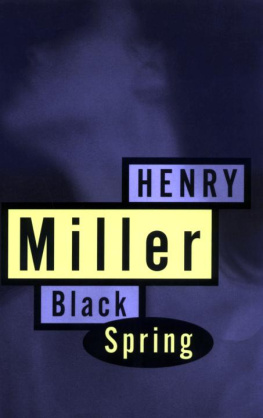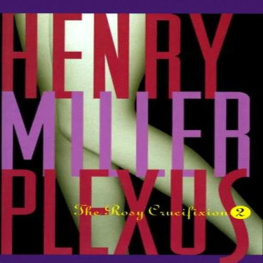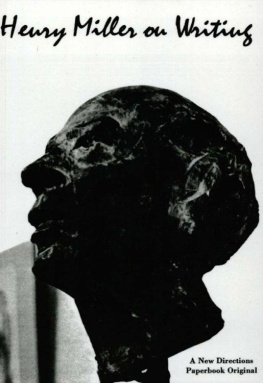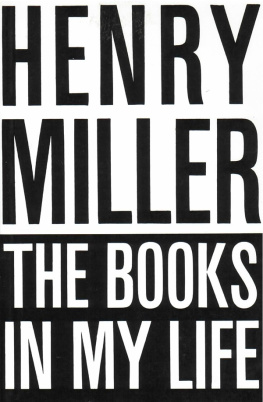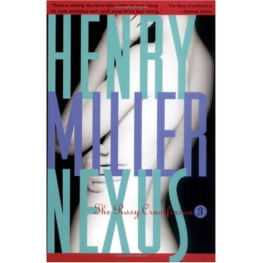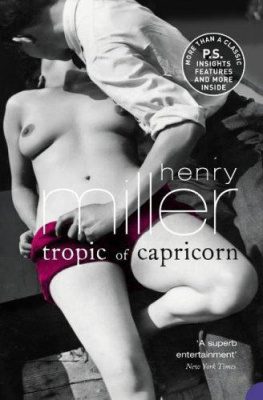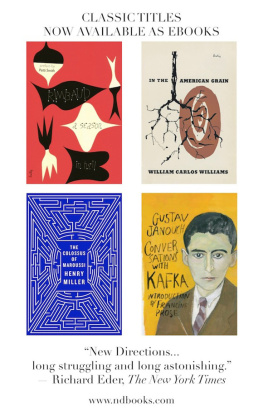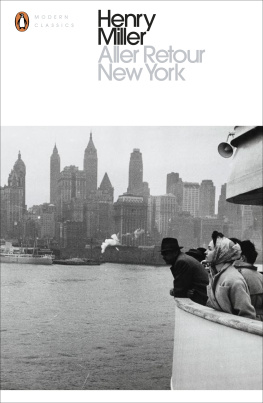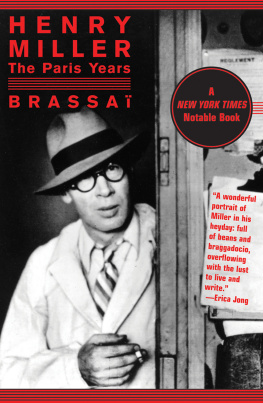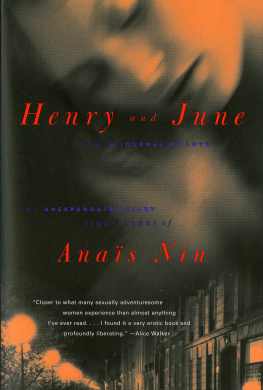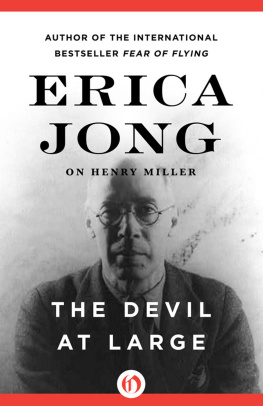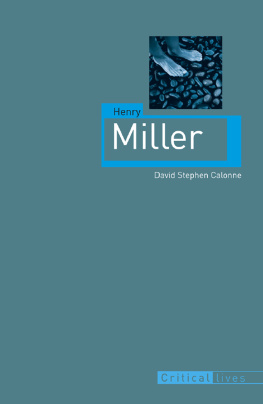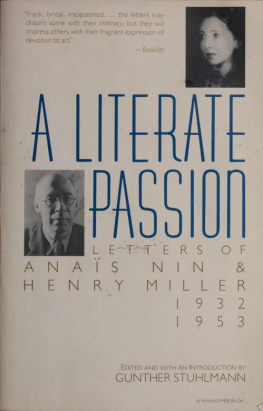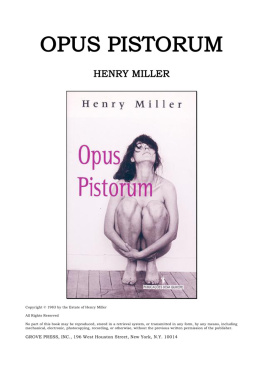Henry Miller - Black Spring
Here you can read online Henry Miller - Black Spring full text of the book (entire story) in english for free. Download pdf and epub, get meaning, cover and reviews about this ebook. year: 1994, publisher: Grove Press, genre: Art / Prose. Description of the work, (preface) as well as reviews are available. Best literature library LitArk.com created for fans of good reading and offers a wide selection of genres:
Romance novel
Science fiction
Adventure
Detective
Science
History
Home and family
Prose
Art
Politics
Computer
Non-fiction
Religion
Business
Children
Humor
Choose a favorite category and find really read worthwhile books. Enjoy immersion in the world of imagination, feel the emotions of the characters or learn something new for yourself, make an fascinating discovery.
- Book:Black Spring
- Author:
- Publisher:Grove Press
- Genre:
- Year:1994
- Rating:3 / 5
- Favourites:Add to favourites
- Your mark:
- 60
- 1
- 2
- 3
- 4
- 5
Black Spring: summary, description and annotation
We offer to read an annotation, description, summary or preface (depends on what the author of the book "Black Spring" wrote himself). If you haven't found the necessary information about the book — write in the comments, we will try to find it.
Black Spring — read online for free the complete book (whole text) full work
Below is the text of the book, divided by pages. System saving the place of the last page read, allows you to conveniently read the book "Black Spring" online for free, without having to search again every time where you left off. Put a bookmark, and you can go to the page where you finished reading at any time.
Font size:
Interval:
Bookmark:


WORKS BY HENRY MILLER PUBLISHED BY GROVE PRESS
Black Spring
Quiet Days in Clichy
The Rosy Crucifixion (3 vols.)
Sexus
Nexus
Plexus
Tropic of Cancer
Tropic of Capricorn
Under the Roofs of Paris (Opus Pistorum)
Crazy Cock
Moloch
Henry Miller






TO ANAIS NIN
Can I be as I believe myself or as others believe me to be? Here is where these lines become a confession in the presence of my unknown and unknowable me, unknown and unknowable for myself. Here is where 1 create the legend wherein I must bury myself.
MIGUEL DE UNAMUNO
The Fourteenth Ward
What is not in the open street is false, derived, that is to say, literature.
I am a patriot-of the Fourteenth Ward, Brooklyn, where I was raised. The rest of the United States doesnt exist for me, except as idea, or history, or literature. At ten years of age I was uprooted from my native soil and removed to a cemetery, a Lutheran cemetery, where the tombstones were always in order and the wreaths never faded.
But I was born in the street and raised in the street. The post-mechanical open street where the most beautiful and hallucinating iron vegetation, etc. Born under the sign of Aries which gives a fiery, active, energetic and somewhat restless body. With Mars in the ninth house!
To be born in the street means to wander all your life, to be free. It means accident and incident, drama, movement. It means above all dream. A harmony of irrelevant facts which gives to your wandering a metaphysical certitude. In the street you learn what human beings really are; otherwise, or afterwards, you invent them. What is not in the open street is false, derived, that is to say, literature. Nothing of what is called adventure ever approaches the flavor of the street. It doesnt matter whether you fly to the Pole, whether you sit on the floor of the ocean with a pad in your hand, whether you pull up nine cities one after the other, or whether, like Kurtz, you sail up the river and go mad. No matter how exciting, how intolerable the situation, there are always exits, always ameliorations, comforts, compensations, newspapers, religions. But once there was none of this. Once you were free, wild, murderous.
The boys you worshiped when you first came down into the street remain with you all your life. They are the only real heroes. Napoleon, Lenin, Capone-all fiction. Napoleon is nothing to me in comparison with Eddie Carney, who gave me my first black eye. No man I have ever met seems as princely, as regal, as noble, as Lester Reardon who, by the mere act of walking down the street, inspired fear and admiration. Jules Verne never led me to the places that Stanley Borowski had up his sleeve when it came dark. Robinson Crusoe lacked imagination in comparison with Johnny Paul. All these boys of the Fourteenth Ward have a flavor about them still. They were not invented or imagined: they were real. Their names ring out like gold coinsTom Fowler, Jim Buckley, Matt Owen, Rob Ramsay, Harry Martin, Johnny Dunne, to say nothing of Eddie Carney or the great Lester Reardon. Why, even now when I say Johnny Paul the names of the saints leave a bad taste in my mouth. Johnny Paul was the living Odyssey of the Fourteenth Ward; that he later became a truck driver is an irrelevant fact.
Before the great change no one seemed to notice that the streets were ugly or dirty. If the sewer mains were opened you held your nose. If you blew your nose you found snot in your handkerchief and not your nose. There was more of inward peace and contentment. There was the saloon, the race track, bicycles, fast women and trot horses. Life was still moving along leisurely. In the Fourteenth Ward, at least. Sunday mornings no one was dressed. If Mrs. Gorman came down in her wrapper with dirt in her eyes to bow to the priest-Good morning, Father! Good morning, Mrs. Gorman!-the street was purged of all sin. Pat McCarren carried his handkerchief in the tailflap of his frock coat; it was nice and handy there, like the shamrock in his buttonhole. The foam was on the lager and people stopped to chat with one another.
In my dreams I come back to the Fourteenth Ward as a paranoiac returns to his obsessions. When I think of those steel-gray battleships in the Navy Yard I see them lying there in some astrologic dimension in which I am the gunnersmith, the chemist, the dealer in high explosives, the undertaker, the coroner, the cuckold, the sadist, the lawyer and contender, the scholar, the restless one, the jolt-head, and the brazen-faced.
Where others remember of their youth a beautiful garden, a fond mother, a sojourn at the seashore, I remember, with a vividness as if it were etched in acid, the grim, soot-covered walls and chimneys of the tin factory opposite us and the bright, circular pieces of tin that were strewn in the street, some bright and gleaming, others rusted, dull, copperish, leaving a stain on the fingers; I remember the ironworks where the red furnace glowed and men walked toward the glowing pit with huge shovels in their hands, while outside were the shallow wooden forms like coffins with rods through them on which you scraped your shins or broke your neck. I remember the black hands of the ironmolders, the grit that had sunk so deep into the skin that nothing could remove it, not soap, nor elbow grease, nor money, nor love, nor death. Like a black mark on them! Walking into the furnace like devils with black hands-and later, with flowers over them, cool and rigid in their Sunday suits, not even the rain can wash away the grit. All these beautiful gorillas going up to God with swollen muscles and lumbago and black hands.
For me the whole world was embraced in the confines of the Fourteenth Ward. If anything happened outside it either didnt happen or it was unimportant. If my father went outside that world to fish it was of no interest to me. I remember only his boozy breath when he came home in the evening and opening the big green basket spilled the squirming, goggle-eyed monsters on the floor. If a man went off to the war I remember only that he came back of a Sunday afternoon and standing in front of the ministers house puked up his guts and then wiped it up with his vest. Such was Rob Ramsay, the ministers son. I remember that everybody liked Rob Ramsay-he was the black sheep of the family. They liked him because he was a good-for-nothing and he made no bones about it. Sundays or Wednesdays made no difference to him: you could see him coming down the street under the drooping awnings with his coat over his arm and the sweat rolling down his face; his legs wobbly, with that long, steady roll of a sailor coming ashore after a long cruise; the tobacco juice dribbling from his lips, together with warm, silent curses and some loud and foul ones too. The utter indolence, the insouciance of the man, the obscenities, the sacrilege. Not a man of God, like his father. No, a man who inspired love! His frailties were human frailties and he wore them jauntily, tauntingly, flauntingly, like banderillas. He would come down the warm open street with the gas mains bursting and the air full of sun and shit and oaths and maybe his fly would be open and his suspenders undone, or maybe his vest bright with vomit. Sometimes he came charging down the street, like a bull skidding on all fours, and then the street cleared magically, as if the manholes had opened up and swallowed their offal. Crazy Willy Maine would be standing on the shed over the paint shop, with his pants down, jerking away for dear life. There they stood in the dry electrical crackle of the open street with the gas mains bursting. A tandem that broke the ministers heart.
Next pageFont size:
Interval:
Bookmark:
Similar books «Black Spring»
Look at similar books to Black Spring. We have selected literature similar in name and meaning in the hope of providing readers with more options to find new, interesting, not yet read works.
Discussion, reviews of the book Black Spring and just readers' own opinions. Leave your comments, write what you think about the work, its meaning or the main characters. Specify what exactly you liked and what you didn't like, and why you think so.

